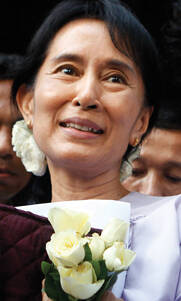Is Burma beginning to emerge from the political darkness of its recent past? While a military junta, some of its members now in civilian garb, has remained in charge since the rejection of multiparty elections in 1990, in recent months there has been some evidence of political thawing. Under house arrest off and on since 1989, Nobel Peace Prize laureate Aung San Suu Kyi was released in November 2010 and has been “actively in dialogue” with various ministers from the ruling party and with Burma’s “moderate” President Thein Sein. The release of 100 political prisoners on Oct. 12 was another step forward, although thousands of political prisoners remain imprisoned under horrendous conditions.
Rangoon’s Archbishop Charles Maung Bo said, “Changes are in progress” in Burma. “We are a people full of hope,” said the archbishop, who is the president of the Office for Human Development of the Federation of Asian Bishops.
Burma’s ruling party, Union Solidarity and Development, which “won” over 75 percent of the seats in a seriously flawed parliamentary election in November 2010, is still directly supported by Burma’s military; and many of the “civilians” appointed by Thein Sein were drawn from among army ranks. All the same, cracks have emerged in the junta’s rule. In addition to the release of Aung San Suu Kyi and the more recent prisoner release, the ruling party bowed to widespread public resistance and halted construction of a dam along the Irrawaddy River in Kachin territory. Trade unions are currently being tolerated, and there has been some evidence of loosening restrictions on Burmese media.
At best, though, opposition leaders will express only cautious optimism. They say it is still premature to predict what future developments may be. There is conflict within the ruling party’s leadership, and Burma remains afflicted with a deep social divide and growing poverty. A recent report from Human Rights Watch suggests that progress toward reform in Burma will likely prove halting. The report charged that “serious abuses” have followed a renewal of hostilities between the Burmese military and the Kachin Independence Army after a 17-year ceasefire broke down in June. The human rights watchdog group said Burmese armed forces have been responsible for killings and attacks on civilians, using forced labor and pillaging villages.
“Renewed fighting in Kachin State has meant renewed abuses by the Burmese army against Kachin villagers,” said Elaine Pearson, deputy Asia director at Human Rights Watch. “Tens of thousands of people have fled through the mountains and jungle at the height of the rainy season, driven away by fear of army attacks.”
“For over half a century,” said Archbishop Bo during a visit to India for the meeting of the Asian bishops, “the country has been led by a military regime that has confiscated our mission schools, expelled foreign priests [so that] today we have only local priests.” The archbishop said the church in Burma is not the victim of “direct persecution,” but there are “restrictions” and “discrimination” on this religious minority that makes up “only 1.3 percent of the population.” However, he said, “there have been positive signs” over the last year for the church in Burma, including thousands of baptisms.
Archbishop Bo argues that Burma should look to the example of India as it continues down the democratic path. He said, “India is the largest democracy in the world, with freedom of expression, religion and press.” Archbishop Bo called it a “very important” point of reference because “in many South Asian countries these freedoms are controlled. India, on the contrary, is a source of inspiration for all.”








